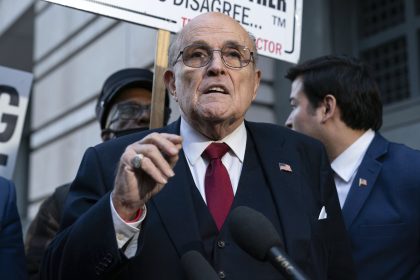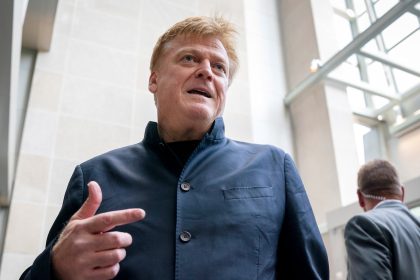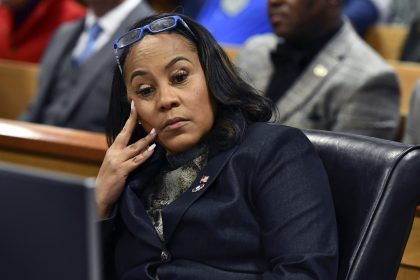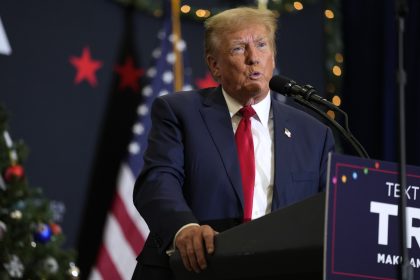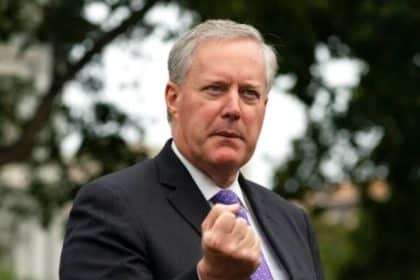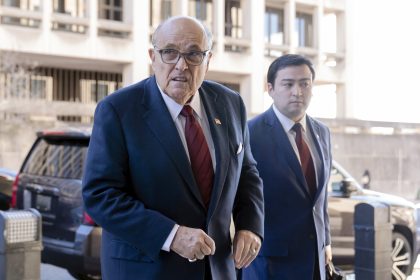Buttigieg Tells Conference America Would Be Better Governed With ‘A Mayor’s Eye View’
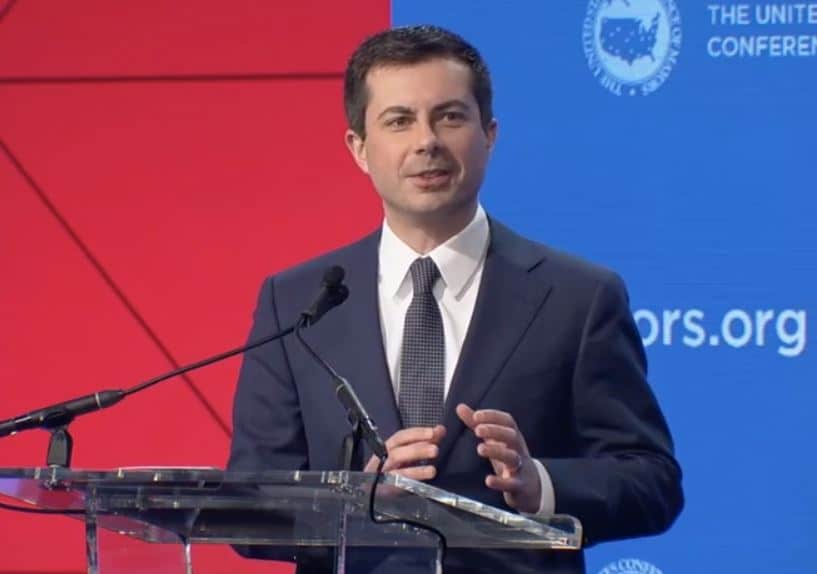
WASHINGTON – A year to the day after ushering reporters into a windowless conference room at the U.S. Conference of Mayors meeting here to announce his seemingly unlikely bid for the White House, former South Bend Mayor Pete Buttigieg returned to the conference Thursday as a leading contender for the Democratic presidential nomination.
“A mayor who is also a president,” Buttigieg quipped after being introduced by Mayor Bryan Barnett of Rochester Hills, Mich., the current head of the conference.
“I join you for the first time as a retiree,” the 38-year-old continued, being nearly drowned out by a standing ovation.
He praised the U.S. Conference of Mayors as “that rare body of high-profile elected officials, from all states and from both parties, who concentrate on getting things done — and actually like each other.”
And that was essentially the theme of the speech he delivered, just miles from the U.S. Capitol, where President Donald Trump’s impeachment trial is being held before the U.S. Senate.
To drive his overarching point home, Buttigieg told the audience of elected local officials, “If you notice a pattern across all of my policies, it’s this: the answers don’t all have to come from Washington, but more of the resources should, and on my watch they will, to support American mayors and cities.”
Though critics sometimes scoff at the eight years Buttigieg spent running a city of 100,000 residents as scant preparation for running the country, the candidate has turned that outsider status into a positive and he’s currently running fifth in most national presidential preference polls.
Another former mayor, billionaire Michael Bloomberg, who used his speech before the bipartisan gathering Tuesday to unveil an $850 billion infrastructure plan, is currently polling slightly ahead of him in the latest Monmouth University and Emerson Polls, while Buttigieg is slightly ahead of Bloomberg in the latest CNN and Economist/YouGov polls.
In all four polls, both Bloomberg and Buttigieg trail frontrunning Vice President Joe Biden and Sens. Bernie Sanders, I-Vy., and Elizabeth Warren, D-Mass.
Elected mayor of New York City for three consecutive terms, beginning in 2002, Bloomberg has been something of a political chameleon, having been a Democrat, then a Republican for his early mayoral races, before switching to independent and then Democrat again.
Buttigieg, a married, gay veteran who presided over the rebirth of a Rust Belt city, has never strayed from the Democratic party.
On Thursday he recalled that when he announced his bid for the presidency “an awful lot of people thought the idea of putting in mayor in the White House [was] a little bit improbable.”
“We had a staff of four and a little office back home smaller than the stage area where I’m standing. I had no big email list, no Senatorial PAC,” he said. “I had a personal fortune amounting to literally thousands of dollars and a name that didn’t exactly roll off the tongue, which is why these days, it’s come to be that my first name is Mayor and my last name is Pete for a lot of people.
“But what we had was this idea that our country would be better off if Washington started to look a little more like our best run cities and towns before the reverse started to happen. And … we made the case for a president accountable to reality in the way that all mayors are, because mayors don’t get to spin alternative facts when there is a problem for all to see in the city,” he said.
“When you are responsible for delivering clean, safe drinking water, you can’t just shut down the government over some partisan disagreement. We just have to get the job done,” he added.
Buttigieg noted that when he’s on the campaign trail, he asks voters to visualize the day when “the sun comes up” and President Trump is no longer in the White House.
“It’s not in a partisan spirit that I offer up that image because I meet an awful lot of Democrats and an awful lot of Independents and an awful lot of Republicans looking to that day,” he said. “And yet I raise the image of that day as a reminder of the fact that that’s not the day that our struggles end. It’s the day that our work begins.”
As Bloomberg had two days earlier, Buttigieg promised that if elected president, he would put “cities and towns at the center of what we do.”
“When we take on an issue like climate change — the global security threat of our time — cities are leading the way. And so we have to not only rejoin the Paris Agreement, it’s time to convene a Pittsburgh Summit to empower the communities that have already been finding local solutions, not waiting for Washington to catch up,” he said.
“When it comes to infrastructure, which is possibly the one area where this president arrived with very high expectations on both sides of the aisle,” Buttigieg continued. “I will admit that to some extent he had me fooled because we knew that infrastructure was a bipartisan priority — good for the economy and sought by Americans from coast to coast — only to see a plan unveiled that had U.S. local governments doing most of the heavy lifting, which is pretty much how it works already.
“Instead of that, we will put forward a trillion dollar plan that will empower mayors to tailor solutions that will grow populations and add businesses and jobs. And under my administration, you will have that support,” he said.
Buttigieg also said he plans to double Community Development Block Grants to $6 billion a year, and to reduce racial health disparities through Health Equity Zones that let communities target strategies for their neighborhoods.
“And we’re going to confront the crisis of mental health and addiction care through $10 billion in Healing and Belonging grants so that communities can leverage your own ingenuity and expertise,” he said.
“We trust communities to design this in a way that makes sense for you,” he continued. “If you want to invest in training teachers to recognize mental illness in students, we’ll help you do that. If it makes more sense for you to focus on housing assistance for those who are confronting addiction, we’ll help you with that.”
Buttigieg said he’s also proposing a “massive” investment in affordable housing and homelessness “that gives communities a flexibility to target those resources where they’re needed most” and said he would triple Title I funding for schools “so that the funding is getting to where it needs to go.”
He closed by saying, “No matter your party, no matter your ideology, I believe it is clear today that the most costly deficiency of our current president is the failure to understand this calling of leadership, that in the same way that a mayor is a walking symbol of the unity of a city, that this is so much more so for the presidency, designed to signal to all in this country that no matter your politics, we do belong to the same republic. In other words, that you cannot fully love a country if you hate half of the people in it. We are in this together.”

















